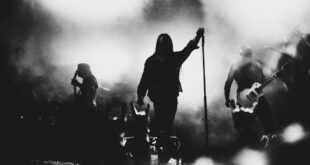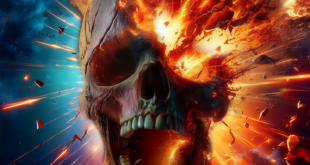
Germany’s Obscura has released Akroasis (which means “hearing” or “listening” in Greek), a modern, technical death metal disc with plenty of progressive overtones.
Firmly rooted in darkness, overall, the sound has a distinctly European flair, invoking early Behemoth to mid-period Vader or later Centurian with blasts of speed, precision, and technical prowess. Obscura also bears has similarity to later Death and current Deafheaven in that the music ranges from highly technical to highly ambient within a single song. A lot of ideas are explored, and a lot of fast turns or tempo changes within verses keep the ear astute.
Highly proficient, the band vacillates between shows of strength and nebulous, dynamic trails. These guys have some serious playing chops behind them, and aren’t afraid to put their skills on show for fans. Akroasis‘s engineering job resulted in a contemporary sounding, crisp recording, where all instruments have plenty of sonic room to explore and expand. All songs are richly layered and meticulously arranged, so there are legion new sonic textures offered to the ear. Songs all contain progressive rock fusion portions, uncommon for regular death metal; definitely interesting highlights. It can be melodic in spots, but there aren’t really any memorable hooks per se. Most of the memorable moments are passages – a bass lead here, a guitar solo there, an atmospheric bridge here, a progressive jazzy interlude there. It’s very much metal for a listener who would rather drift along, then be captivated by hooks and an emotional rollercoaster. It’s eclectic, but not enough so as to alienate a purist death metal audience – for fans who want it fast, growly, and loaded with double bass drums, this is a crushing offering.
Male vocals are guttural, mid to low pitched, and vary from a gravelly scream to howl. Fairly well enunciated, the vocals allow the band to carry at least snippets of their message forth, rather then the genre standard of using the vocal as another layer or texture. Not guttural and not the tortured screams of black metal, again this texture serves the music it’s designed to support. Some kind of vocal processing is added to some of the choruses and interjections, which gives a ‘flashback to 80s pop’ feel. This imparts melody and an interesting, but fleeting texture to an otherwise fairly dissonant, atonal, typical death metal platter. It seems to be meant to add an ethereal or floating dynamic to the music. For an unsuspecting listener, it’s a little strange, but definitely exploratory. The guitar ranges from a heavy rhythm groove to hyperspeed finger-tapping and swept runs. Perfect within the context of the music, this serves the songs, rather then seeming like randomly inserted shred solos. Multiple layers of guitar keep the sound full, thick, and aggressive, even during solos. The guitar does get video game noisy at times, possibly deliberately, especially during the album’s opening track, “Sermon of the Seven Suns”. The band doesn’t use keyboard layers to make their music more complex, which is really refreshing. Some of the finger tapping solos do have a very up-to-date, processed electronic or synth sound. Guitar solos are well performed, surgically precise, frequent, and will bust the chops of all but advanced players. Obscura makes face-melting part of its day job. Of the instrumental elements, Linus Klausenitzer‘s bass guitar tone is most unusual and outstanding. Klausenitzer’s use of chords, an extended range instrument, and a clean tone, coupled with lines that do not duplicate the guitar, really make the sound pop and come alive. Bass guitar stands out prominently in each song without sounding falling afoul of a “lead bassist” problem. For the most part, Sebastian Lanser‘s selected drum tempos are crazy. Lanser’s drums run the gamut of standard death metal offerings, running between the “d beat” clicky double-bass drum blastbeat, to a midtempo groove, to a slower dirge. The most genre-standard components on Akroasis are the vocals and the drums.
The microtonal bends during “The Monist”‘s introduction, and in some verses as a cleaner underlayer, impart a quavering, unsteady feel, which matches the discordance beautifully. Quavering dissonance, almost countrified bends and slides, and guttural vocals during the verses render “The Monist” fairly distinct from the remainder of the album. “Ten Sepiroth” has some of the nicest, explosive riff introductions, allowing for a very punchy and daringly melodic delivery. “Ode to the Sun” has a militaristic set of breaks, which are melodic and interesting. “Perpetual Infinity” starts as more straight-ahead, hair-swinging thrash affair, a little more accessible to a new listener then most of the album.
Obscura’s key strength, a part of its signature sound, lies in it’s precision and execution. To discover a true death metal band that understands dynamics is a real treat, regardless of how many hooks they’ve included in the songs. The overall effect is a drift through musical darkness – a journey through proverbial dark alleyways, cold nights, and not the most pleasant of emotions. The band doesn’t waver in their energy, so, after a few songs, the consistent intensity and high-speed note delivery of the music has a tendency to fade into the background, with slower sections bringing some attention and focus back. Akroasis is a cohesive, long-playing riff factory that floats from one jagged riff to the next, an aural journey to a listener brave enough to attempt a top to tail session.
On Akroasis, Obscura isn’t afraid to push the boundaries of extreme metal, and that’s refreshing. Blistering speed, technical precision, and the omnipresent evil overtone highlight both the band and the release.
Track Listing:
Sermon of the Seven Suns
The Monist
Akroasis
Ten Sepiroth
Ode to the Sun
Fractal Dimension
Perpetual Infinity
Weltseele
Band Lineup:
Steffen Kummerer – Vocals & Guitars
Rafael Trujillo – Guitars
Linus Klausenitzer – Bass
Sebastian Lanser – Drums
Links:
Official Band Website
Official Band Facebook Page
Recommended Tracks: “Perpetual Infinity” or “The Monist”
 PlanetMosh Keeping it Metal
PlanetMosh Keeping it Metal


